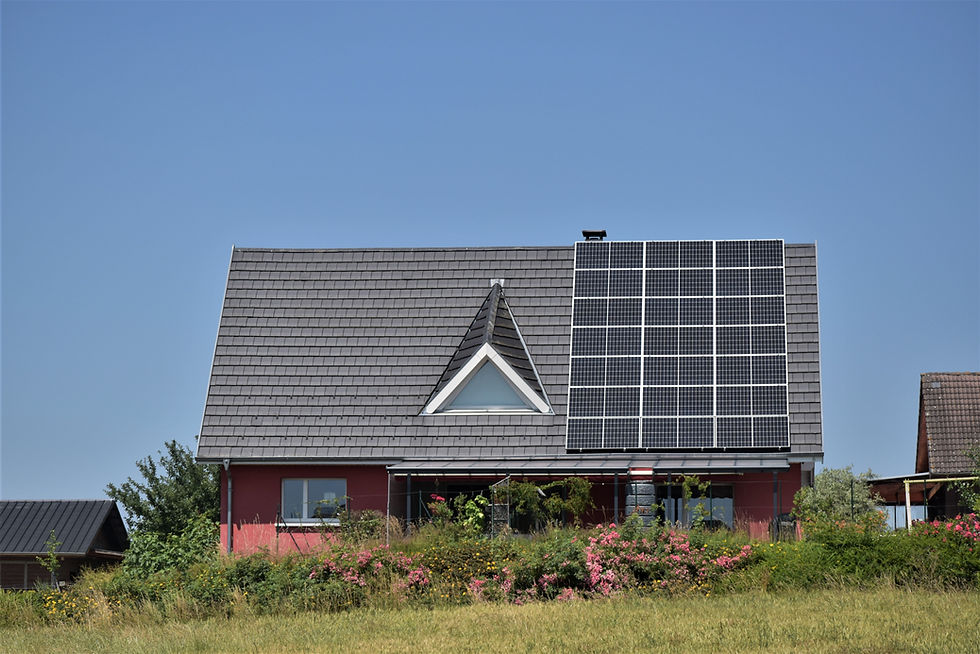Energy-Efficient Smart Homes: Solar Integration & AI-Driven Climate Control for Sydney
- Home Technology Integration

- Sep 13, 2025
- 3 min read
I

ntroduction
Rising energy costs and climate concerns are making energy efficiency a top priority for Sydney homeowners. Smart technology offers new ways to reduce consumption while keeping homes comfortable. By combining AI-driven climate control, solar and battery systems, and efficient lighting and appliances, the smart homes of 2025 can save money and cut carbon emissions.
Smart Thermostats & AI-Driven Climate Control
Smarter thermostats and HVAC systems automatically adjust your home’s heating and cooling based on occupancy, weather and your preferences. AI controllers like the latest ecobee or Nest learn your habits and optimise energy use, while sensors monitor temperature and humidity to keep every room comfortable. Research shows that AI-driven climate control and energy monitoring technologies can dramatically reduce energy consumption【803208859984549†L69-L80】. With Control4 integration, you can set energy-saving scenes that dim lights, lower blinds and reduce HVAC output when you leave, or pre-cool your home before you return.
Solar & Battery Integration
Solar panels paired with battery storage have become affordable and reliable. Modern systems capture and store energy during the day and power your home at night, significantly reducing reliance on the grid. Solar adoption is booming because energy costs are rising and homeowners value sustainability【803208859984549†L69-L80】. Batteries like the Tesla Powerwall store excess solar energy for later use or backup during outages. Control4 can monitor solar production, battery levels and grid consumption in one dashboard, and adjust loads to maximise solar self-consumption.
Energy Monitoring & Load Management
Knowing where your energy goes is the first step to saving. Smart meters and home energy monitors such as Sense provide real-time insight into each device’s usage and alert you to spikes. AI software analyses your consumption patterns and suggests ways to cut waste. You can schedule high-demand appliances like dishwashers or washing machines during off-peak hours or coordinate with solar output. Smart plugs and energy-saving outlets also allow you to eliminate vampire power by cutting power to electronics when they’re not in use【713651991345059†L330-L349】.
Smart Lighting & Appliances
LED lighting uses far less energy than incandescent bulbs and lasts longer. Platforms like Philips Hue let you create lighting scenes that adjust brightness and colour temperature throughout the day【713651991345059†L91-L108】. Automated switches and motion sensors turn lights off when rooms are vacant, saving electricity. Energy-Star appliances and AI-powered whitegoods like refrigerators, ovens and washing machines further reduce consumption by optimizing their cycles and detecting maintenance issues【229502709946377†L506-L513】.
Insulation & Motorized Shades
Smart window treatments play a bigger role in energy efficiency than people realise. Motorised blinds and curtains can react to temperature and sunlight, closing during the hottest part of the day to reduce heat gain or opening to let in warming winter sunlight. Integrated sensors measure indoor and outdoor conditions so that shades and awnings operate at the right times【229502709946377†L517-L521】. When combined with improved insulation, double-glazed windows and energy-efficient HVAC systems, your home stays comfortable with less energy.
Water Management & Outdoor Efficiency
Energy efficiency isn’t just about electricity; it includes water too. Smart irrigation controllers use soil moisture and weather data to water lawns and gardens only when necessary【229502709946377†L532-L535】. Leak detection sensors alert you to hidden water leaks, preventing damage and wasted water【229502709946377†L497-L513】. Pool pumps and heaters can be scheduled to run during sunny or off-peak times to minimise electricity use.
Green Habits & Control4 Integration
Technology alone won’t make a home sustainable; it takes mindfulness. Use Control4 or similar automation platforms to create energy-saving routines: schedule everything off when you leave, gradually dim lighting after dark and track your consumption in a dashboard. Encourage your family to unplug devices, use natural light and embrace sustainable practices. Working with a certified integrator like Home Technology Integration ensures your solar, battery, HVAC, lighting and security systems all communicate seamlessly. Together, they create a home that’s comfortable, efficient and ready for the future.




Comments